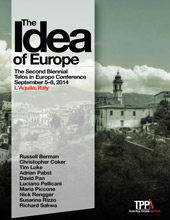In this video from the 2014 Telos in Europe Conference, Benjamin Martin talks about his research on the idea of European culture, arguing that its emergence among intellectuals after World War I and its subsequent embrace by the Nazis and Italian Fascists serves as a cautionary historical lesson.
|
In this video from the 2014 Telos in Europe Conference, Christopher Coker discusses why the idea of the West is an idea whose historical moment has come and gone, and how the collapse of the Western project is reflected in the crisis of liberal internationalism and the problems arising out of identity politics. At the 2014 Telos in Europe Conference in L’Aquila, Italy, sociologist Dan Krier talked about his experiences at the conference as well as what distinguished the Telos conference from more discipline-specific academic gatherings. For anyone interested in participating in the upcoming 2015 Telos Conference in New York, abstracts will be accepted through October 20. For complete details and the full call for papers, please visit the Telos-Paul Piccone Institute website. We hope to see you there! Whether you attended or not, you’ll want to see this wonderful collection of photos from the recent Telos in Europe Conference, held in L’Aquila, Italy, in early September. Below is a sample, but you can view the full set over at our Facebook page. And just a reminder, there’s still time to submit your abstract for the upcoming 2015 Telos Conference in New York. For complete details, visit the Telos-Paul Piccone Institute website. The following paper was presented at the recent Telos in Europe conference on “The Idea of Europe,” held in L’Aquila, Italy, on September 5–8, 2014. The following paper was presented at the recent Telos in Europe conference on “The Idea of Europe,” held in L’Aquila, Italy, on September 5–8, 2014. |
||||
|
Telos Press Publishing · PO Box 811 · Candor, NY 13743 · Phone: 212-228-6479 Privacy Policy · Data Protection Copyright © 2025 Telos Press Publishing · All Rights Reserved |
||||
 In a paragraph of Daybreak, Nietzsche spoke of Romanticism’s “great reaction”[1] to the Enlightenment. Zeev Sternhell has brought out two distinctive elements of this centuries-long European revolt against the “rationalist modernity”:[2] the rejection of the claim to “mold people’s lives” by means of enlightened reason, and the reevaluation of faith as “an essential foundation of society”[3] accompanied by the idealization of the spiritually united medieval civilization as contrasted with the atomized modern society in the grip of decadence. This current of thought was the symptom of the crisis of the pre-Enlightenment traditional societies, described by Professor Pellicani as closed, static, rigidly prescriptive cultural universes in which, to cite Jaspers, “everything is under the control of symbols of being, held fast in unquestioned orders.”[4] The anti-Enlightenment movement aimed precisely at refounding these collapsed civilizations. One thinks of Novalis’s picture of medieval Europe pacified by the all-binding force of Christendom embodied by the clergy exercising a pastoral power in order to reshape men into salvation-worthy subjects.
In a paragraph of Daybreak, Nietzsche spoke of Romanticism’s “great reaction”[1] to the Enlightenment. Zeev Sternhell has brought out two distinctive elements of this centuries-long European revolt against the “rationalist modernity”:[2] the rejection of the claim to “mold people’s lives” by means of enlightened reason, and the reevaluation of faith as “an essential foundation of society”[3] accompanied by the idealization of the spiritually united medieval civilization as contrasted with the atomized modern society in the grip of decadence. This current of thought was the symptom of the crisis of the pre-Enlightenment traditional societies, described by Professor Pellicani as closed, static, rigidly prescriptive cultural universes in which, to cite Jaspers, “everything is under the control of symbols of being, held fast in unquestioned orders.”[4] The anti-Enlightenment movement aimed precisely at refounding these collapsed civilizations. One thinks of Novalis’s picture of medieval Europe pacified by the all-binding force of Christendom embodied by the clergy exercising a pastoral power in order to reshape men into salvation-worthy subjects. 

